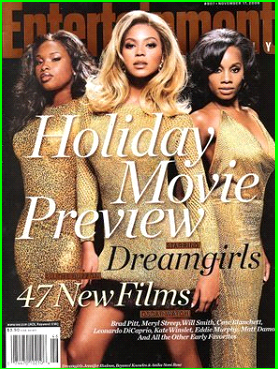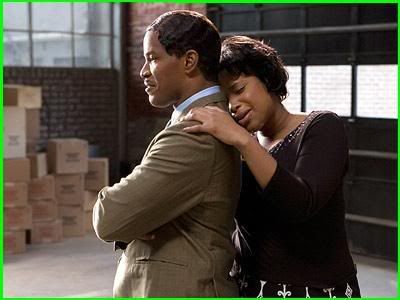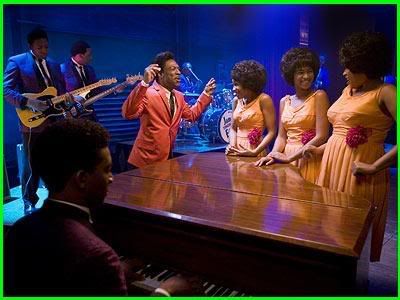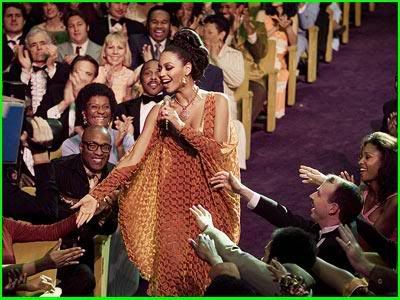Friday, November 10, 2006
posted by Chi-Chi at 11/10/2006 | Permalink
On a Newsstand by you....Dreamgirls does "Entertainment Weekly"
Beyonce Knowles, Jennifer Hudson and Anika Noni Rose who plays The Dreamettes in the new movie, "Dreamgirls" grace the cover of "Entertainment Weekly."
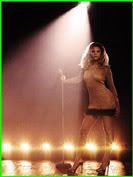

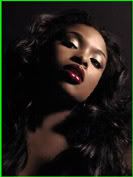



Doesn't Beyonce and company got you thinking about Diana Ross and The Supremes or her own girl group, Destiny's Child?!?!
Damn I miss listening to Destiny's Child on the radio!
~~~
"Twas roughly the night before Christmas, 2005, and in a Los Angeles house, a creature was stirring. Actually, he was more than stirring. He was agitated. Writer-director Bill Condon was due to start filming the ambitious musical Dreamgirls in less than two weeks, on Jan. 4, 2006, and he had intimations of doom.
Why the panic attack? By and large, Condon was in great shape. He was an experienced filmmaker, having helmed 1998's Gods and Monsters (which brought him an Oscar for Best Adapted Screenplay) and 2004's Kinsey. He'd also written the script for 2002's Chicago, which won six Academy Awards including Best Picture. Clearly, he had this musical thing down, even if he'd never actually directed one.
On top of those plus-column items, Condon had lined up one of the most musically talented casts in years — and arguably the strongest roster of African-American actors since that other high-profile white director's act of cinematic solidarity, Steven Spielberg's 1985 opus The Color Purple. Jamie Foxx, the Oscar winner from Ray, would play Curtis Taylor Jr., a ruthless early-1960s Detroit talent manager with more than a passing resemblance to Motown's real-life impresario Berry Gordy. Grammy winner Beyoncé Knowles would be Deena Jones, the Diana Ross-ish protégée whom Curtis discovers in a girl-singer trio, the Dreamettes (soon renamed Deena Jones and the Dreams — just like Diana Ross and the Supremes). Eddie Murphy would take on an unprecedented dramatic supporting role as James ''Thunder'' Early, a troubled, womanizingsoul-music powerhouse on a downward career arc, while Tony winner Anika Noni Rose was set for Lorrell, one of the original Dreamettes and also James Early's long-suffering mistress.
Still, there was one crucial cast member Condon remained anxious about: Jennifer Hudson, a season 3 American Idol contestant who'd appeared in some regional theater and on a Disney cruise ship, but had never acted in a film. She was the last main performer hired. She'd beaten nearly 800 open-call candidates and a number of other semifinalists (including Idol winner Fantasia Barrino) for the part of Effie Melody White. As devotees of Michael Bennett's original Broadway production of Dreamgirls well know — and Condon belongs to that circle, having been mesmerized on opening night in 1981 — Effie is the chunky, cranky epicenter of the Dreamettes. She starts out singing lead before getting pushed into a backup slot, and winds up kicked out of the group altogether. Effie is a tortured, torturing Hamlet of a character, a diva di tutti divas. Legions of gay theater buffs (again, Condon included), along with plenty of straight theatergoers and critics, have been cultishly obsessed with Miss White ever since a 21-year-old named Jennifer Holliday brought her to life on stage.
And so, Condon agonized. ''I was deeply aware that we could get everything else right in this movie,'' he says, looking cheerfully boyish at 51 over a recent lunch in L.A. ''But unless Jennifer came through, the whole thing would collapse.
Why the panic attack? By and large, Condon was in great shape. He was an experienced filmmaker, having helmed 1998's Gods and Monsters (which brought him an Oscar for Best Adapted Screenplay) and 2004's Kinsey. He'd also written the script for 2002's Chicago, which won six Academy Awards including Best Picture. Clearly, he had this musical thing down, even if he'd never actually directed one.
On top of those plus-column items, Condon had lined up one of the most musically talented casts in years — and arguably the strongest roster of African-American actors since that other high-profile white director's act of cinematic solidarity, Steven Spielberg's 1985 opus The Color Purple. Jamie Foxx, the Oscar winner from Ray, would play Curtis Taylor Jr., a ruthless early-1960s Detroit talent manager with more than a passing resemblance to Motown's real-life impresario Berry Gordy. Grammy winner Beyoncé Knowles would be Deena Jones, the Diana Ross-ish protégée whom Curtis discovers in a girl-singer trio, the Dreamettes (soon renamed Deena Jones and the Dreams — just like Diana Ross and the Supremes). Eddie Murphy would take on an unprecedented dramatic supporting role as James ''Thunder'' Early, a troubled, womanizingsoul-music powerhouse on a downward career arc, while Tony winner Anika Noni Rose was set for Lorrell, one of the original Dreamettes and also James Early's long-suffering mistress.
Still, there was one crucial cast member Condon remained anxious about: Jennifer Hudson, a season 3 American Idol contestant who'd appeared in some regional theater and on a Disney cruise ship, but had never acted in a film. She was the last main performer hired. She'd beaten nearly 800 open-call candidates and a number of other semifinalists (including Idol winner Fantasia Barrino) for the part of Effie Melody White. As devotees of Michael Bennett's original Broadway production of Dreamgirls well know — and Condon belongs to that circle, having been mesmerized on opening night in 1981 — Effie is the chunky, cranky epicenter of the Dreamettes. She starts out singing lead before getting pushed into a backup slot, and winds up kicked out of the group altogether. Effie is a tortured, torturing Hamlet of a character, a diva di tutti divas. Legions of gay theater buffs (again, Condon included), along with plenty of straight theatergoers and critics, have been cultishly obsessed with Miss White ever since a 21-year-old named Jennifer Holliday brought her to life on stage.
And so, Condon agonized. ''I was deeply aware that we could get everything else right in this movie,'' he says, looking cheerfully boyish at 51 over a recent lunch in L.A. ''But unless Jennifer came through, the whole thing would collapse.
Condon knew that the original Effie's towering Act 1 showstopper, ''And I Am Telling You I'm Not Going'' — sung as she is sent packing from the Dreams — was not merely the stuff of legend. It was easily accessible legend, thanks to a Tony Awards telecast clip of Holliday that now hovers just a mouse click away on YouTube. That would put huge pressure on Hudson to hold up to direct comparisons, and Condon felt that despite good work in rehearsals, she hadn't quite hit heavyweight-champ status. ''It felt as if she was kind of still learning it all,'' he recalls. ''There was some essential Effieness she hadn't quite captured.''
So Condon cut short Hudson's year-end vacation with her family in Chicago, her hometown. He summoned her back to L.A. and, starting the day after Christmas, convened an emergency weeklong Diva 101 class, just director and actress. ''Everybody else had like a week or two off,'' says Hudson, a guileless, wide-eyed young woman who, like Knowles, turned 25 this past September. ''I had 48 hours.'' Condon started drilling Hudson intensively, exploiting every free minute. ''He ordered me to come into the studio just being a bitch,'' Hudson remembers. ''I consider myself very professional. But Effie is unprofessional. He told me, 'Jennifer, you're too sweet. Stop saying thank you. Stop coming in on time. Get an attitude. Be a diva, it's okay. Be angry. Be rude. Be evil.'''
Judging from an early look at Dreamgirls, Condon's crash course worked spectacularly well. (DreamWorks and Paramount will officially open the film in a reserved-seat engagement in New York, L.A., and San Francisco on Dec. 15, with a wider release on Dec. 25.) Handicappers are talking Hudson's performance way up, with Murphy's strong musical and dramatic chops also generating award-nomination chatter. Looking back, Condon is especially glad now that he got all boot camp on Hudson at the last minute. ''We went through every moment of the movie,'' he says. ''And we would play those games. 'What would Effie say to that? What would Effie do?' And Jennifer did it. It started to happen. It was this final push into owning any room she walked into, and being the center of attention she deserved to be.''
{spotted at Straight Outta NYC}
{Source}










